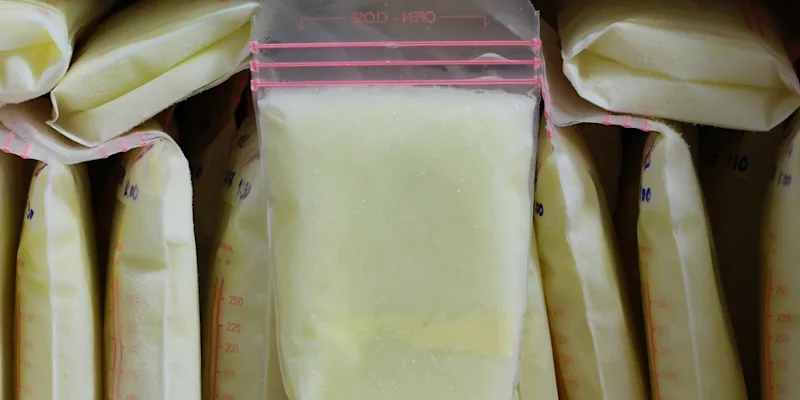This article was updated in January 2024
We asked one of our trusted advisors and friends, Jacqueline Kincer, IBCLC®, CSOM, CEO & Clinical Manager at Holistic Lactation, to help us answer the Top 5 most Googled questions about breastmilk and breast pumps.
(Q) Can I re-heat my breast milk twice?
(A) You can only re-heat breastmilk once because every time it’s heated, beneficial immunological properties and micronutrients are broken down. This is why it is important to store breastmilk in smaller quantities—so you don’t end up reheating too much at once and have to discard that liquid gold.
(Q) How long can I keep my breast milk out at room temperature?
(A) Breastmilk can be safely stored at room temperature for 4 hours (77 degrees F or colder). It can go as long as 6 hours, but we know 4 hours or less is best. The biggest safety factor will be ensuring you’ve washed your hands before pumping and using sanitized pump parts and breastmilk storage containers. If you won’t be using the milk you just pumped for the next feeding, store it in the refrigerator or freezer right after pumping.
(Q) How do I order a breast pump with insurance?
(A) There are many ways to order a breast pump through insurance. You can search FSA eligible break pumps on Target and there are many other third-party companies that have insurance verification tools. Your best bet is to contact your health insurance plan and ask how to get a covered breast pump. Also, make sure to ask which pump parts & accessories are covered and the limit for coverage of those items (it’s usually a dollar amount per year).
(Q) How long can I keep my breast milk in the freezer?
(A) Breastmilk can be stored in the freezer for 6 months and possibly up to a year. If you have a deep freezer, it will store longest there. Make sure to store it in the back of the freezer where there are the least temperature fluctuations from opening and closing the door.
(Q) Do I need a breastmilk warmer?
Breastmilk can be warmed in a cup of hot water! No fancy tools are required. There are a lot of bottle warmers on the market, and it all depends on personal preference and needs (battery operated, plug-in is fine, etc.). I usually tell clients to bring an insulated container full of hot water and pour the hot water into the lid or a cup and then place the bottle there for a few minutes to warm up the milk.
A Note On Breastfeeding from The American Academy of Pediatrics
The American Academy of Pediatrics recommends exclusive breastfeeding of infants for the first six months of life before introducing nutritious complementary foods while encouraging social and systemic changes to support mothers who choose to breastfeed.
The AAP outlines its recommendations and evidence of significant health benefits to infants and mothers within an updated policy statement and technical report titled “Breastfeeding and the Use of Human Milk,” Published in the July 2022 issue of Pediatrics and available online on June 27. Here's a breakdown of their report:
The AAP recommends:
- Exclusive breastfeeding for the first 6 months. There is no need to introduce infant formula or other sources of nutrition for most infants. Beyond 6 months, breastfeeding should be maintained along with nutritious complementary foods.
- AAP recommends that birth hospitals or centers implement maternity care practices that improve breastfeeding initiation, duration, and exclusivity.
- There are continued benefits from breastfeeding beyond 1 year, and up to 2 years, especially in the mother. Long-term breastfeeding protects against diabetes, high blood pressure, and cancers of the breast and ovaries.
- Mothers who choose to breastfeed beyond the first year need support from their medical care providers and protection against workplace barriers.
- Policies that protect breastfeeding, including universal paid maternity leave; the right of a woman to breastfeed in public; insurance coverage for lactation support and breast pumps; on-site child care; universal workplace break time with a clean, private location for expressing milk; the right to feed expressed milk; and the right to breastfeed in child care centers and lactation rooms in schools are all essential to supporting families in sustaining breastfeeding.
However, we know that breastfeeding is not for everyone, and there are myriad reasons that one might consider formula feeding instead, or a combination of both. If you're considering formula feeding, we recommend consulting with your pediatrician to help you identify and source the best option for your baby.
Whatever your feeding journey is, there are resources to support you, including Jacqueline's team at Holistic Lactation.

About Jacqueline Kincer, IBCLC®, CSOM CEO & Clinical Manager at Holistic Lactation
As a leader in breastfeeding & lactation support, Jacqueline serves clients locally and worldwide. She's an International Board Certified Lactation Consultant and a Certified Specialist in Orofacial Myology (which is a fancy name for a specialist in oral function).
Jacqueline helps mothers competently & confidently breastfeed. She works with clients to remove the compensations they've been using to make things work and achieve functional breastfeeding outcomes. This means she gets to the root cause to fix the true problem so moms & babies can enjoy happy and healthy breastfeeding.
She and her team help women go from about-to-give-up to surpassing their breastfeeding goals. They work closely with moms by providing compassionate support and boldly honest answers to what’s *really* going on so you can confidently enjoy breastfeeding your baby.



